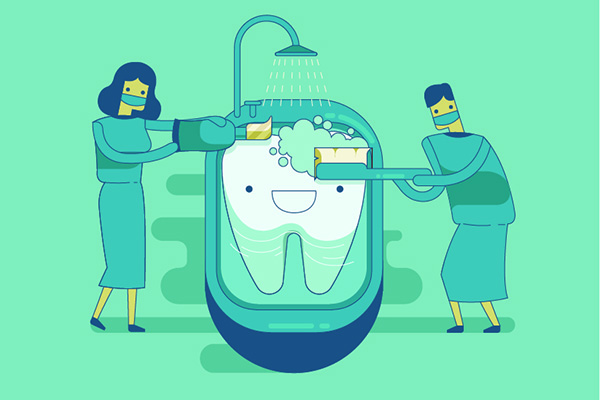Relieving Pain With Root Canal Therapy

Root canal therapy is often recommended to resolve issues that cause severe tooth pain, such as deep dental decay and tooth infection. In addition, root canal therapy can also save a damaged tooth from needing to be extracted, falling out, and/or causing concerns with surrounding teeth and the gums.
Relieving pain with a root canal treatment
A dentist may recommend root canal therapy if alternative treatment options are not viable options to restore the health and appearance of a tooth that is damaged, decayed, or infected. The following discussion highlights how root canal therapy can help relieve dental pain.
Root canal therapy defined
Root canal therapy is a dental procedure that involves removing diseased or decayed pulp inside the pulp chamber, which is located inside of the tooth’s root. This procedure is typically recommended to treat deep dental cavities and oral infections that infect the dental pulp inside of the tooth. It is often used as a last option when less invasive procedures such as a dental filling are not an option to avoid the loss of the tooth or the worsening of symptoms.
When root canal therapy is recommended
Root canal therapy is used for several reasons. The primary purpose of root canal therapy is to treat tooth infections. A tooth infection can result when bacteria accumulate inside the root of the tooth. In many cases, a dental abscess can form as well, which can be drained during a root canal procedure and/or with the use of antibiotics.
Another use for root canal therapy is treating deep tooth decay. While minor cavities can be addressed with a dental filling, a more severe cavity that extends deeper toward the tooth’s root may require root canal therapy. The best way to determine if root canal therapy or an alternative procedure is most appropriate for you is to visit a dental professional.
The root canal therapy procedure explained
The root canal therapy procedure is a minimally invasive procedure, but some dental offices offer sedation to increase the patient's comfort. The procedure typically involves accessing the root of the tooth, which may involve drilling a small hole in the tooth. The decayed, infected, or damaged portion of the tooth’s dental pulp is then removed, then the tooth is filled with a substitute material that is known as gutta-percha. The tooth is then sealed and a temporary crown is placed while the patient awaits their custom permanent crown from the laboratory.
Recovering from root canal therapy
The patient should not feel much, if anything, during the root canal procedure, but there is typically some discomfort for up to a week after the procedure. To help ensure a fast and successful recovery following a root canal, it is important to keep the mouth clean at all times by brushing, using mouthwash, and staying hydrated. Patients can also use a cold compress and a saltwater rinse to alleviate swelling and discomfort, as well.
The risks of leaving an infected or decayed tooth untreated
In many cases, an infected or severely decayed tooth that is left untreated leads to worsening symptoms, including more intense tooth pain and sensitivity, worsening gum swelling and inflammation, and the spread of an oral infection to other parts of the mouth and body. After severe symptoms develop and the root of the tooth continually weakens, the tooth may fall out naturally or become so severely damaged that extraction is necessary. This leads to the need for tooth replacement, which makes the treatment process longer, more costly, and invasive.
The risks of root canal therapy
There are risks of root canal therapy, although complications are incredibly rare. Most notably, a failed seal of the tooth when completing the root canal therapy process can lead to food particles and bacteria invading the tooth and causing additional decay or infection, which both lead to painful symptoms and a need to return to the dental professional for retreatment. With that said, the success rate of root canal therapy is well above 90% (American Association of Endodontists) and complications are relatively easy to address if they do occur.
Are you experiencing tooth discomfort?
It is important to treat tooth discomfort as quickly as possible to avoid any worsening concerns. If you are experiencing issues that suggest you may need root canal therapy or an alternative procedure, then we encourage you to call our dental team today to schedule a convenient time for a visit.
Request an appointment here: https://alexoldtowndental.com or call Alexandria Old Town Dental at (703) 763-1078 for an appointment in our Alexandria office.
Check out what others are saying about our dental services on Yelp: Root Canal Treatment in Alexandria, VA.
Related Posts
To manage the pain you will feel after a root canal treatment and to prevent infection, it is critical to follow proper aftercare. The treatment is standard, so it should not be a surprise to your dentist. Once you go home, you will need to follow some aftercare tips to keep your mouth healthy. Here…
Root canal treatment is used to address infection or inflammation of the nerves and blood vessels in a tooth’s pulp chamber. The contents of the pulp chamber can become inflamed or infected for various reasons like trauma to a tooth, an untreated crack, or severe deep decay. Root canal treatment often allows patients to save…
Root canal treatment can help with gums and the underlying jawbone. Read on to learn more about this endodontic treatment. This article discusses root canal treatment and how it can improve the health of the tooth receiving the treatment as well as the gums that support it. Gum and tooth health often go together. If…
Most people find root canal treatment frightening. This procedure has a bad reputation for being painful and unpleasant. But your dentist has the skills and instruments necessary to handle the process efficiently and with minimal pain. There is a possibility that a patient may have numerous teeth that require extensive treatment. The dentist can assess…


